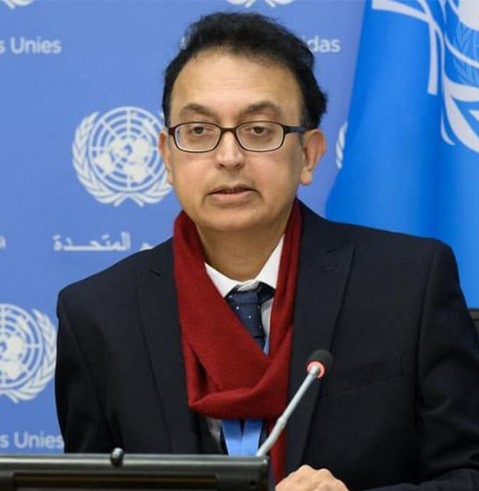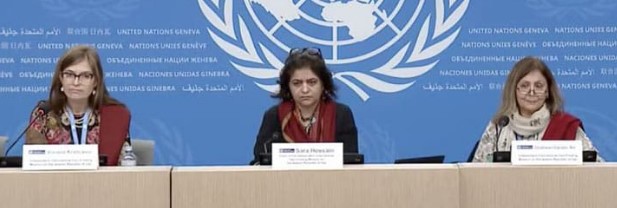 The month of March saw several reports published about the situation of human rights in Iran from different organisations, in efforts to expose the Iranian regime's crimes and hold them accountable.
The month of March saw several reports published about the situation of human rights in Iran from different organisations, in efforts to expose the Iranian regime's crimes and hold them accountable.
Professor Javaid Rehman, UN Special Rapporteur on human rights violations in Iran, called for international investigations into the 1988 massacre of political prisoners and other emblematic events, including disappearances, executions, and the 2019 protests. Professor Rehman's tenure has been extended, continuing as Special Rapporteur for another term.
The UN-appointed Fact-Finding Mission, probing Iran's 2022 protests, concluded the government's repression and gender discrimination constituted crimes against humanity.
Amnesty International's March 6 report unveiled the Iranian authorities' intensified persecution of women and girls, highlighting testimonies revealing the daily hardships faced due to compulsory veiling laws, reflecting a systematic effort to undermine their resistance.
Special Rapporteur, Professor Javaid Rehman, Reports on the Human Rights Situation in Iran
 In his February 9, 2024, report to the UN Human Rights Council, Professor Javaid Rehman provided an overview of the situation of human rights in Iran. He expressed deep concern “at the spike in death penalty sentences and executions,” “executions in relation to the protests,” “execution of child offenders,” “execution of women,” “arbitrary arrests, detention and violations of the right to a fair trial,” “increasing limitations placed upon the rights to freedom of opinion and expression,” “the situation of women and girls,” including “law and policies of enforced veiling,” and “rape and sexual violence,” “the arrest and detention of human rights defenders and lawyers,” and “the situation of minorities.”
In his February 9, 2024, report to the UN Human Rights Council, Professor Javaid Rehman provided an overview of the situation of human rights in Iran. He expressed deep concern “at the spike in death penalty sentences and executions,” “executions in relation to the protests,” “execution of child offenders,” “execution of women,” “arbitrary arrests, detention and violations of the right to a fair trial,” “increasing limitations placed upon the rights to freedom of opinion and expression,” “the situation of women and girls,” including “law and policies of enforced veiling,” and “rape and sexual violence,” “the arrest and detention of human rights defenders and lawyers,” and “the situation of minorities.”
Professor Rehman highlighted grave concerns about the situation of women and girls, urging the elimination of persecution, discrimination, and violence against them, as well as their equal participation in public life and the protection of women human rights defenders. He criticised Iran's maintenance of a system of gender apartheid and draconian laws violating human rights, calling for respect for women's rights and freedom of expression in clothing choices. He also called for an immediate end to monitoring women's behaviour through morality police and technology, condemning the persistence of laws and practices promoting violence against women and girls, including within the criminal justice system.
The Special Rapporteur also highlighted that a state policy of intimidation and persecution targets those seeking justice, perpetuating impunity and systematically denying truth and access to justice, particularly for victims of human rights violations and their families. The absence of an independent judiciary, politicised through revolutionary courts, hinders accountability, with the judiciary consistently violating the rule of law and international human rights obligations. Despite calls for investigations, the Iranian authorities refuse to conduct compliant inquiries, resorting to intimidation and mistreatment to deter victims, families, and lawyers from raising complaints or protesting.
First Report by the Independent International Fact-Finding Mission
 The Independent International Fact-Finding Mission concluded that pervasive institutionalised discrimination against women and girls in Iran triggered widespread human rights violations and crimes under international law. Urging Iranian authorities to halt executions, release arbitrarily detained individuals, and cease judicial harassment, the mission calls for repealing discriminatory laws, disbanding the enforcement of mandatory hijab, and providing justice, truth, and reparations to victims of the September 16, 2022 protests. Considering internal impunity, Member States should seek international and domestic accountability outside Iran and provide reparations, including restitution, compensation, rehabilitation, and guarantees of non-repetition, in line with human rights standards.
The Independent International Fact-Finding Mission concluded that pervasive institutionalised discrimination against women and girls in Iran triggered widespread human rights violations and crimes under international law. Urging Iranian authorities to halt executions, release arbitrarily detained individuals, and cease judicial harassment, the mission calls for repealing discriminatory laws, disbanding the enforcement of mandatory hijab, and providing justice, truth, and reparations to victims of the September 16, 2022 protests. Considering internal impunity, Member States should seek international and domestic accountability outside Iran and provide reparations, including restitution, compensation, rehabilitation, and guarantees of non-repetition, in line with human rights standards.
Amnesty International: Looking at the Iran's Compulsory Hijab Laws
Amnesty International's report, titled "Draconian campaign to enforce compulsory veiling laws," published on March 6, 2024, focuses on the impending adoption of the Hijab and Chastity Bill by the Iranian parliament, aiming to escalate enforcement against women and girls defying compulsory veiling.
The report highlights Iranian authorities' widespread surveillance and mass police checks targeting women drivers to enforce repressive veiling laws. Amnesty International revealed that targeted women and their relatives have received threatening messages instructing them to surrender their vehicles to the Moral Security Police as punishment. The organisation reviewed 60 such messages sent to 22 individuals over the past year.
Additionally, women detailed to Amnesty International how access to public transport, airports, and banking services is often denied unless they wear a headscarf. They recounted instances of state enforcers refusing entry to women and girls without headscarves, accompanied by verbal abuse and threats of prosecution. One woman described an incident in late 2023 where an enforcer at a Tehran metro station assaulted her 21-year-old cousin.


